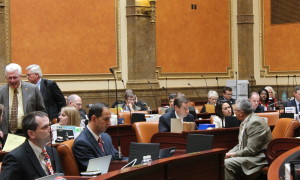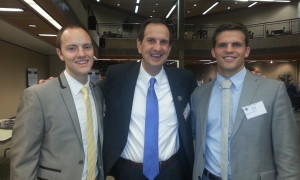The Work Never Ends
With the legislative session now nearly three months in the past, one would think that legislative work would have significantly slowed. However, nothing could be farther from the truth. There was about a month when it seemed like almost everyone took a break from legislative work, but then it started right up again.
There are two main efforts that will continue through the summer and fall: interim committee work and preparing legislation for the next session. Here is a quick overview of what I have planned.
Interim Committee Work
Legislators are generally assigned to work on the same committees during the interim as they worked on during the session. Unfortunately, scheduling differences frequently require assignment changes. In my case, I was moved from the Political Subdivisions Committee to the Interim Judiciary Committee, in addition to the Interim Health and Human Services Committee and the Education Appropriations Subcommittee.
In May, the interim committees met to review guidelines for the year and start our work. Leadership has asked us to significantly reduce the number of topics we cover and focus on just two or three main topics that will benefit from in-depth study. We have also been asked to identify and eliminate required committee reports that are essentially pro forma in nature and do not contribute to policy decisions.
The Interim Judiciary Committee will be focusing on family law over the summer, which I find interesting. I find it challenging that the committee is mostly comprised of attorneys who seem to have no qualms with wading through minutia, and in my opinion we run the risk of missing the forest for the trees.
The Interim Health and Human Services Committee is a little more comfortable for me, and three topics have been proposed for in-depth review: developing policy to address an aging population, revisiting the Medicaid preferred drug list, and grappling with the concept of medical marijuana. Perhaps next month I will have more to report on these issues.
Legislation Development
It is frequently the case that good ideas take two or more years to implement. While I had hoped to draft and pass bills to address concerns that came from constituents, the compressed time frame made that impossible to do well. The interim allows an opportunity to select a few topics and really dig in to get them ready for the session.
As I have reviewed the proposals I worked on during the session, there are two that I would like to focus on over the summer, and see if there is a possibility of making policy changes for the better.
Education funding block grants is an interesting concept that I believe could generate efficiencies and positive benefits if it is done properly. The proposal is actually quite simple. The legislature has created a dozen or more special funding programs in the statute that restrict how some funds can be used. The Block Grant Pilot would allow the State Board of Education to approve applications from local school districts to be exempt from the requirements of those special programs and get true flexibility in how state funds would be used at the local level. The key to this program is that in exchange for the flexibility, the local districts would also propose specific changes they would make, along with measures of expected outcomes that should improve because of the additional flexibility. I think this idea has great potential as a pilot program so that districts can innovate and we can learn more about what works and what doesn’t.
Another issue I want to explore is the issue of motor vehicle mechanical inspections (also called Safety Inspections). It was brought to my attention that nationwide, states are getting rid of these expensive and burdensome requirements and the data show virtually no impact on actual safety. Of the western states, only Utah, Texas, and Hawaii still have this requirement; even California has done away with it. In Utah, older cars are inspected more frequently than newer cars, which places an increased burden on lower-income families in both time and money.
Perhaps it is time to consider whether we should follow suit of all of our neighbors in allowing individuals to be responsible for the maintenance of their vehicles. I would like to take some time this summer to gather facts and data about on the costs and benefits of this program and make an informed decision about how to proceed.
Of course, I am also very interested in hearing from you about issues that impact your life. I would be especially interested to hear about ideas for reducing the burden of government on families and businesses.




I love the idea of getting rid of safety inspections. I had heard those statistics and think it probably makes sense to get rid of the requirement since it apparently makes no impact on safety.
Would the emissions inspection remain in place or would that be eliminated too?
Emissions inspections are required by the federal government but only in certain counties.